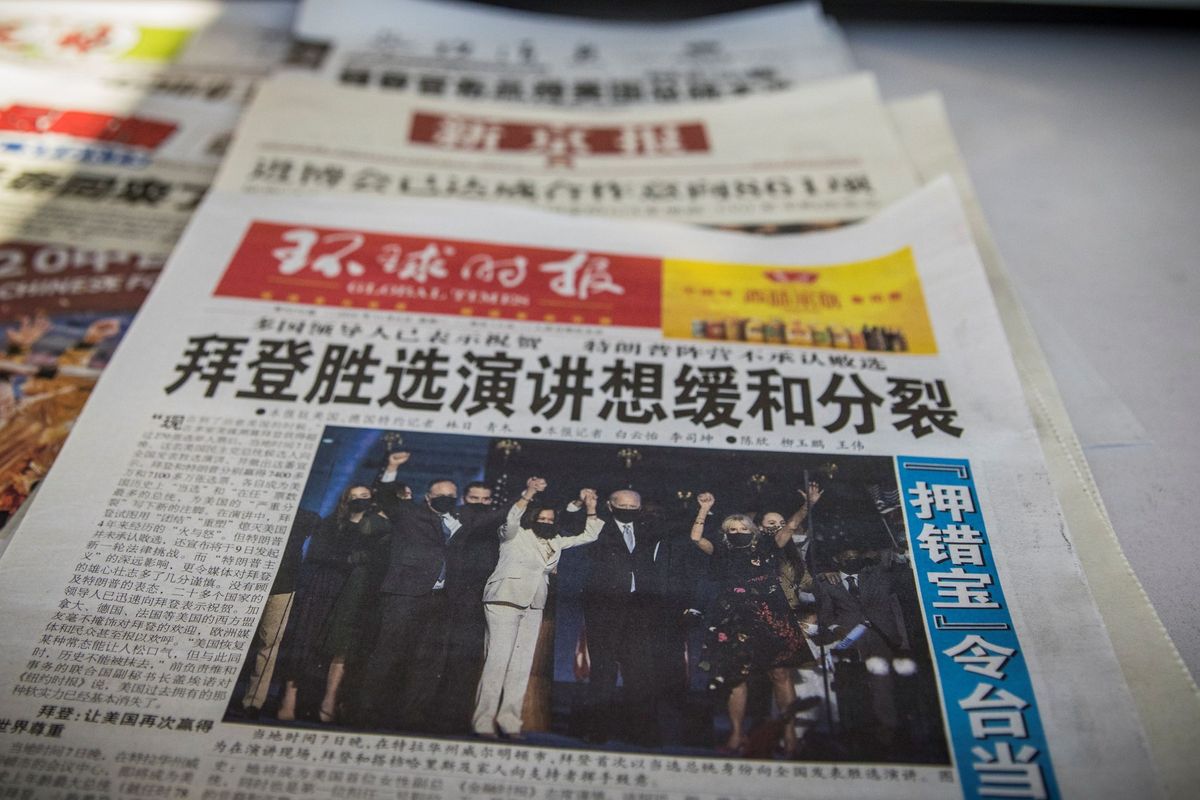One week later, China acknowledges Biden’s win

A few minutes every morning is all you need.
Stay up to date on the world's Headlines and Human Stories. It's fun, it's factual, it's fluff-free.
US-China tensions are expected to go down somewhat under President-elect Joe Biden, who promised a return to Obama-era policies during his presidential campaign.
On November 13, in its first acknowledgment of the United States’ election results, China officially congratulated President-elect Joe Biden and Vice President-elect Kamala Harris before hastily condemning the Trump administration for its recent actions against the country.
Wang Wenbin, a spokesperson for the Chinese Foreign Ministry, told reporters, “We will respect the American people’s choice,” adding, “We congratulate Joe Biden and Kamala Harris.”
In a nod to the many lawsuits filed by the Trump campaign in an effort to reverse the outcome, Wang said, “We understand the results of the election will be determined according to US laws and procedures.”
The notable delay in China’s recognition of the results, along with its hesitation to declare a victor, differed from the tone of other Asian leaders. Japanese Prime Minister Yoshihide Suga and South Korean President Moon Jae-in took to Twitter on November 7, the same day the election was called, to congratulate Joe Biden and Kamala Harris on their win.
Indian Prime Minister Narendra Modi also tweeted his congratulations, directly addressing the historic nature of Kamala Harris’ vice-presidential win. Kamala Harris will be the first Indian American and the first woman to fill the role of vice president.
Chinese officials, however, remained silent until almost a week after the election was called for Biden. China has historically been quick to congratulate a president-elect on their win. It’s thought that the delay in this case might be due to the economic pressure the Trump administration had placed on the country and reflects China’s desire to reduce tensions between the countries rather than inflame them.
Wang also threatened unspecified retaliatory action against the US in response to comments made by Secretary of State Mike Pompeo during a radio interview on November 12, in which Pompeo said that Taiwan “has not been a part of China.”
These comments run counter to the official position of the US in its diplomatic relations with China, which is that the US agrees to not maintain formal diplomatic relations with the island, considered by Beijing to be a “renegade province.” Despite this, the US and Taiwan have unofficial embassies in each other’s capital cities.
“We solemnly tell Pompeo and his ilk, that any behavior that undermines China’s core interests and interferes with China’s domestic affairs will be met with a resolute counterattack by China,” Wang added.
In a move that led to an increase in tensions between the two countries, President Donald Trump signed an executive order prohibiting Americans from investing in a group of Chinese companies the US believes supply and support the Chinese military.
Tensions between China and the US have ratcheted to new highs under the Trump administration, which has placed restrictions and bans on Chinese companies and products, the most notable of which targeted the Chinese telecom giant Huawei. These moves reflect the “America first” approach the Trump administration has placed at the center of its foreign policy decisions.
These tensions are likely to go down somewhat under Biden, who promised a return to Obama-era policies during his presidential campaign. Under the Obama administration, the US placed an emphasis on a multilateral but relatively loose approach to pressure on China. This reflected the Obama administration’s belief that more interaction with Western countries would nudge China closer to becoming a more democratic society.
Wang Xiangsui, an academic at Beihang University, said that the messages from Biden officials were positive. “The consensus is that we do need to reset and redefine our relationship but we need to be patient,” Wang said, adding, “China is also waiting for a proper opening. The present atmosphere is poisonous and we need to handle it with caution.”
Wang also said that Biden had already assembled a team of over 2,000 security advisers and foreign policy experts, many of whom have worked previously with Beijing on behalf of the US. Some of these experts are expected to take on senior positions in the Biden White House.
Some global analysts, however, are urging the Biden administration not to return to a pre-Trump relationship with China, but rather to grow multilateral efforts toward relations while maintaining the pressure brought by the Trump administration. This would presumably involve leaving certain restrictions in place on Chinese goods.
Matthew Bey, a senior global analyst at a private intelligence firm, says that “While there is a chance that the trade war can reduce in intensity – we expect some level of tariffs on China to remain in place initially.”
“The underlying tech war that we have seen emerge is likely to remain in place,” Bey added.
Biden’s official position on the US relationship to China centers around partnering with the country in order to denuclearize North Korea and fight against climate change.
Have a tip or story? Get in touch with our reporters at tips@themilsource.com




Comments ()